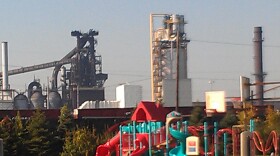We've been talking a lot about class, what it means, and how we define it.
We took a trip to St. Joseph and Benton Harbor. They’re called the Twin Cities, but they're different.
In Benton Harbor forty-three percent of families live below the poverty line.
In St. Joseph it’s six percent.
And, families in St. Joseph earn more than twice as much as their neighbors across the river.
Here's a video produced by Meg Cramer and Mercedes Mejia who spoke to residents on both sides of the river.
http://www.youtube.com/watch?v=i3_SAwMzY8I
Transcript of the video:
Gladys Peeples-Burks – Retired educator: "I think there is a perception that St. Joe is superior to Benton Harbor in many, many ways. I think economics now is a large factor. When you drive around the city of St. Joseph and you see parks that are well maintained, you see well keep and neat houses, and you see thriving business. And then, you drive across the bridge and see block after block of abandoned housing."
Lynn Todman – Executive Director, Institute on Social Exclusion – Adler School of Professional Psychology: "The river is a metaphor for what’s happening in the community. It’s the visual representation…I want to say “cleavage” between the two communities, or the gap or the breach between the two communities."
Beth Larson - Resident of St. Joseph: "I definitely think that people still think there is a division between St. Joe and Benton Harbor. St. Joe is predominately white and Benton harbor is predominately black."
Eli Zilke -Resident of Benton Harbor: "But yeah, people, especially not in the situation have a stigma about Benton Harbor, a very negative one."
Lynn Todman: "But a very obvious way to bridge the gap, they kind of social, racial and class gap that’s symbolized by the river would be to put some kind of transportation in that would allow people to go back and forth. That has not happened. I can add that it’s probably not cost effective to have two fire departments, three school districts, two city halls. It’s a small community. The two of them together, it’s a small community. So, it would make economic sense for them to work more closely together, and certainly social sense as well."
Gladys Peeples-Burks: "St. Joseph needs Benton Harbor. Benton Harbor needs St. Joseph I think they need each other simply because there are good things in both places."
Residents on both sides acknowledge that there is a divide.
But the people we talked to are hopeful the gap can be bridged.
Eli Zilke: "You know, I think it’s moving towards a connecting factor. I think with the Arts District, you know people are starting to cross the line a little bit and people are starting to come over and see what Benton Harbor has to offer from the other side."
Mika Page - Resident of Benton Harbor: "It’s good to meet different people and not to stay boxed in and closed off from a certain city. So, I think the bridge connects."
Beth Larson: "That could also be a way to bring people together to get to know each other in that we do have different cultures and we do different things in the different towns, we could still cross over and meet with each other and just become part of each other."









